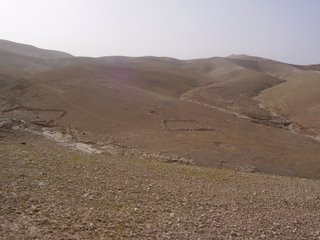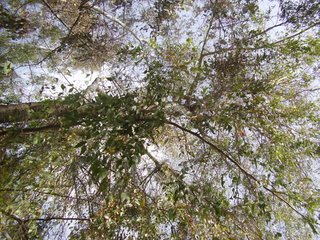Parshat Balak

This Photograph was taken in the Judean desert, east of Jeursalem, and some ten kilometers west of the northern tip of the Dead Sea and near Jericho. Two somewhat rectangular shapes in the midde are actually the remains of ancient corral enclosures, "sheepfolds,"("gidrot tsone" in Heb.) which are mentioned an number of times in the Bible, such as First Samuel, 24:3, "And he came to the sheepfolds by the way, where there was a cave; and Saul went in to relieve himself; and David and his men remained in the back of the cave."
“For there is no divination in Jacob and no magic in Israel, thus in time it will be said to Jacob, what has God wrought?” (Numbers, 24:23)
The story is well known. Bilaam, arch sorcerer of the ancient world, master of the black arts, just about the scariest magi--mafioso in the middle-east three and a half thousand years ago, was hired by Moabites to curse the Jews. Just about a sure thing, as everyone had seen that the fate of Bilaam’s curse was worse that the fate of a frog zapped in the microwave (a purely hypothetical situation, didn’t never happened ‘round these parts, no way, no how, and may the Almighty continue to protect us). So all of the middle easterners, Moabites, Midianites, Ammonites, you name it, were having this huge shpielkess, mammash plotzing, after hearing about the miracles that were performed for by God for the children of Israel with the exodus of Egypt. To make a long story short, Balak king of Moab hires Bilaam to curse the Jews, so they build a bunch of altars on mountaintops overlooking the holy encampment of the twelve tribes around the Tabernacle. It must have been a sight and a wonder to behold. And Bilaam’s getting good money, mammash millions, gold krugerands, endless wads of greenbacks, diamonds, rubies, you name it, and honor, woah, there, he’s invited to all the posh events with the movers and shakers and policy-makers whose one goal is, “destroy the Jews.”
So what happens? He offers all the bulls on the on the mountaintops, raises his hands to the Almighty who has made him the official prophet for the nations of the world, and then, wonder of wonders, when he opens his mouth to curse the Jews, the most beautiful praises of Israel come out of his mouth. He’s miraculously transformed into the best friend Israel ever had. It is as if Bin Ladin sent a videotape from his sumptuous cave in Waziristan praising Israel and urging the world to support the Zionist Redeemer.
Now one of Bilaam’s praises was:
“For there is no divination in Jacob and no magic in Israel.”
Reading this simply, it is interesting that the greatest sorcerer of his day, with the possible exception of Pharaoh, would praise Israel by saying that they are either not practitioners of magic and witchcraft or not effected by it. It sounds like he is repudiating his own profession. What is Bilaam saying about the intrinsic qualities of Israel? The answer to this question can be found in Rashi. Rashi was Rabbi Shlomo ben Yitschak of eleventh century France, who besides being the all time master biblical commentator and Talmudic master of his day, knew how to make one heck of a good barrel of wine. And this is what he said: “There is no divination in Jacob – because there are no diviners or sorcerers among them they are thus worthy of blessing.” In other words, since Israel is a pure nation, since they lead their lives according the Torah of God and are not wasting their time with séances voo-doo orgies, God is thereby pleased with them and blesses them.
There are several places in the Pentateuch (Five Books of Moses) that forbid magic and witchcraft. One is Deuteronomy (Devarim) 18:10, which says, “When you come to the Land that God is giving you, do not learn how to do the abominations of those nations. There shall not be found among you one who passes his son or daughter through the fire, one who uses divination, a soothsayer, and enchanter, a witch or a necromancer. For all of these things are an abomination to God, and because these nations are involved in such abominations is God driving them out of the land before you.”
The Mei Hashiloach, true to all divinely inspired geniuses, explains the terms divination (nachash) and magic (qesem) in a different way. His analysis of the specific choice of terminology and word-matching found in the verse reveals an understanding of the character traits of the Israelite. This teaching is consistent with the Mei HaShiloach’s entire philosophy of vertical illumination, by which I mean the ability of certain worthy individuals to know what to do directly from God. The moral instruction is a call for man to know who he is, where he stands with God, and to be honest with his choices based on that assessment. In short, after you have gone through a process of earnest spiritual and moral refinement, “killing yourself over the fulfillment of the Torah,” so to speak, then when you absolutely know that something is from God, you cannot hesitate. Rather, you must follow that understanding as if you were standing at the foot of Mount Sinai, listening to the voice of God from the mouth of “Gevurah.” This takes the quality of “tekufut,” which means not holding back, but knowing that your will and God’s will have reached a synthesis and you glorify God by following your heart. If you are not sure, and I add, based on other teachings in the Mei HaShiloach, if you have not gone through the process of refinement, then don’t act rashly or impetuously, rather follow the Talmudic Dictum, “shev ve’al ta’ase,” meaning, sit down and take a breather, look around, and wait for some kind of sign to lead you the way. And you will be shown the way …
What follows it the translated words of Rav Modechai Yosef of Isbitza, the Mei HaShiloach.
“For there is no divination in Jacob and no magic in Israel ...”
(The italics are my own notes on the translation)
“ Divination” (nachash, in Hebrew) is stubbornly holding on to something without letting that thing go out of your mind. Magic (qesem, in Hebrew) is the opposite. (The meaning of qesem presented here has nothing to do with conjuring or supernaturally manipulating nature.) When man equivocates over something, wondering whether to do it or not, he is advised to wait and see how it turns out. If it turns out well, he does it, and if it doesn't, he refrains. This is qesem or waiting to see how something will act of its own accord. Both modes of behavior (qesem and nachash) are forbidden when not used in their proper place. This means that at a time when one knows God's will with clarity, it is forbidden for him to remain silent and let things happen of their own accord, but must rather strengthen himself like a lion and act with strength. In a place where one is uncertain of something it is forbidden to act with force, but rather to consider how the action may come out of it's own accord without his mental input. This is as we find in the Gemara, (Chullin, 95a), “Rav observed a ferry-boat,” for when he reached a river the boat just came to him, without any effort of his own. From this he understood that it was from God, and without this sign he would not have traveled. Therefore it is written the word usually translated as “divination” (nachash) with really means not to hold back, but just to do, is associated with the name Jacob, for, “Jacob,” is called a man who is not yet in a state of completeness and whose heart is not yet drawn after G-d's will. We find that when the prophet is expressing the smallness of Israel he calls it in the name of Jacob, as in (Amos, 7:2), “how shall Jacob stand for he is small?” Therefore he said that there shall be no nachash “unbridled, unencumbered resolve” in Jacob, for at a time when a soul in Israel is uncertain about something he must not act stubbornly, but rather remove all affliction from himself, and see that however G-d acts, that is how he will act in the matter. (When the Mei HaShiloach says, “removal of affliction,” he means that his action is not a veiled outlet for an animal desire, meaning his decision is not based on a desire for the adultery or murder made famous by “the Ten Commandments” before Hollywood.) And when the verse says, “no qesem in Israel,” it refers to one whose heart is completely drawn after God. Then whatever thought falls into his head is nothing less that God’s own desire and has been divinely bestowed upon him. Acting upon this thought would not be irresponsible, but should rather be done with force. If he is on the level of “Israel,” and his desire is an expression of the Divine will, then rejecting his refined desire would be rejecting God. Thus Bilaam praised Israel, showing us how every Jew, whether he is on the level of Yaakov (unsure) or Israel (absolutely positive), recognizes his value and acts accordingly.

